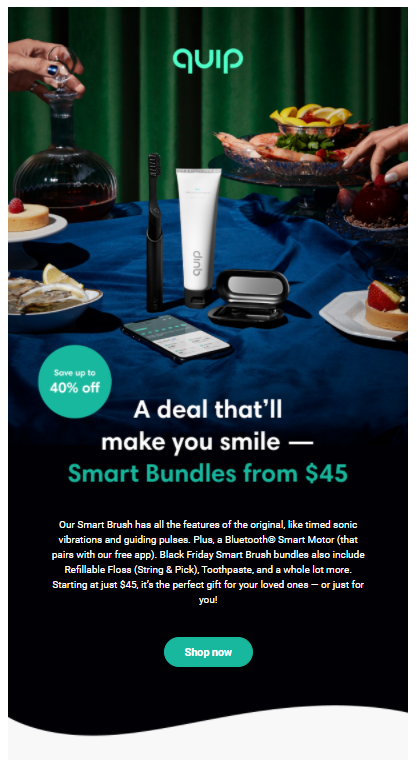
Replacement Brush Heads: Quip vs Goby vs Sonicare vs Brüüsh

That being said, many people like Sonicare and Brüüsh’s high number of powerful brush strokes per minute, and if you can afford the higher starting price, it is a wonderful option for anyone who wants the most powerful brush around. The easy answer is the one you are most likely to use! So, if Quip’s design and affordable price is what will make you most likely to actually brush your teeth, regularly, then it is the clear winner. Of the various toothbrushes we’ve reviewed, which gets your teeth the cleanest? So, if you are worried about your mouth’s health, or just want to do everything you can to have a strong smile (and gums), you should consider getting one. In other words, less plaque and a lower risk of gingivitis if you use an electric toothbrush. With regard to gingivitis a 6% reduction (Löe Silness index) was seen at one to three months and a greater reduction of 11% in the long term.” An 11% reduction in plaque (Quigley Hein (Turesky) index) was shown at one to three months and a 21% reduction in plaque at longer than three months. This study, as reported in the Cochrane Library of clinical research papers, found that “ powered toothbrushes are more effective than manual brushes in reducing plaque and gingivitis in the long and short term. A great feature of this study is that it had a large sample size of 4624 participants, so the researchers had a lot of data to analyze before they reaching conclusions. powered ones shows that electric brushes likely provide better cleaning. Benefits of a powered brushĪ meta-study of manual toothbrushes effectiveness vs. (Can you imagine brushing your teeth while having the brush actually connected to a wall outlet? That doesn’t sound dangerous at all…) These tooth-tools were first recommended for people who had problems using a regular brush due to mobility/motion issues, but dentists gradually started to suggest that a broader population could benefit from the deeper clean via an electric brush. Powered toothbrushes have existed since the 1920’s, and it was GE who popularized the battery powered automatic toothbrush in the 60’s. First, do you really need an electronic toothbrush? Skip ahead to find out if Quip, Goby or Sonicare is the right toothbrush for your mouth and budget. Choosing the one that is best for you really depends on who you are. These companies are battling for your mouth – but what are the key differences between these electronic toothbrush providers? How different can their products really be? (Turns out, pretty different.) And can they really keep your chompers as shiny as Vanna Whites’? The answer is yes, depending on how you use them. Importantly, each 10-piece refill pack comes in a convenient, individual cardboard sleeve, and you could easily slide a few into a suitcase for a long trip without any fear of them breaking open and spilling.ĭid gum need to be reinvented, or optimized for travel? Probably not! But with prices that compare well to buying gum at the store, the convenience of automatic deliveries, and the hygienic nature of the hands-free dispenser, Quip certainly gave gum lovers something to chew on.If you care about the health of your teeth, you’ve probably seen TV and online ads for electric toothbrushes from companies like Quip, Goby, Sonicare and Bruush. That’s pretty competitive with the higher-end gums in the grocery store checkout line, and quite a bit less than you’d pay at the airport Hudson News for an emergency pack of Chicklets. The more gum you buy, the less it’ll cost, but you’re generally looking at about $2 per 10-piece pack, including shipping.

Thereafter, you’ll receive refills every three months in increments of nine packs (90 pieces). Your first delivery comes with either 90, 180, or 270 pieces of gum, plus either a free plastic dispenser, or a $10 metal one.

You won’t find Quip’s gum refills in stores, but rather, you subscribe to get them delivered.


 0 kommentar(er)
0 kommentar(er)
